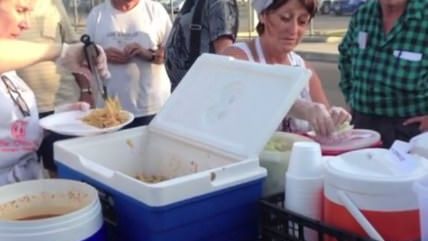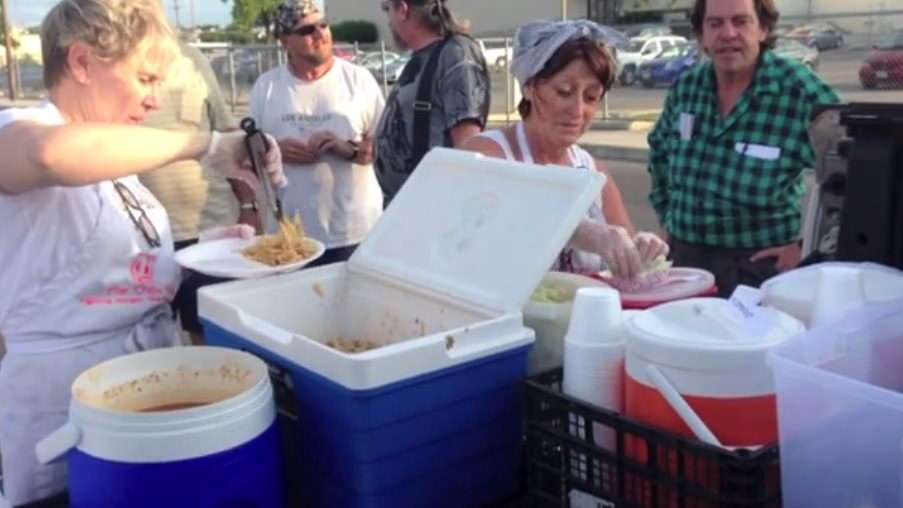Another Infuriating Crackdown on Sharing Food With the Homeless
San Antonio targets a good Samaritan, because rules are rules.


"Do good Samaritans get tickets in San Antonio?" asked chef Joan Cheever last week.
"Yes," replied Mike Marrota, the police officer to whom Cheever had directed the question. Marrota, who was joined on the scene by a trio of fellow bike cops, then handed the good Samaritan a ticket. For $2,000.
Cheever's alleged offense? Sharing restaurant-quality food with the homeless and less fortunate "without a permit."
As Cheever explained to Marrota, according to a Texas Public Radio account of the exchange, the food she serves every Tuesday evening, part of charitable work she's done for the past decade, was prepared in a commercial kitchen. Food handlers were licensed. The food truck from which she serves was permitted. But with no special permit for giving food away to people who can't afford to buy it, Cheever faces a ridiculous (and steep) fine.
No matter. Rule are rules, right?
And because they are, it's worth pointing out that Officer Marrota appeared, at the very moment he handed the ticket to Cheever, to be in violation of a San Antonio Police Department policy that prohibits officers from visible displays of body art. Marrota looks to have a star tattoo on his right arm.
The San Antonio ticket is only the latest such example of crackdowns on those who share food with those in need. Shockingly, it's not even the most ridiculous recent example. Last year, 90-year-old chef Arnold Abbot made news when he was arrested by Ft. Lauderdale police for sharing food with the homeless. He faced two months in jail and hundreds of dollars in fines, according to reports. Abbot, a hero, kept on sharing food.
Recently, Abbot's arrest became an issue in Ft. Lauderdale mayor Jack Seiler's re-election campaign. Unfortunately, Seiler was re-elected.
San Antonio and Ft. Lauderdale are hardly outliers. A 2014 report found that nearly one in 10 American cities criminalizes sharing food with the homeless. Another report found that dozens of other cities have recently considered passing such bans.
That's the infuriating data. And it fits a pattern I've documented many times in recent years. In fact—and it brings me no joy to point this out—this is the fifth year in a row I've written something for Reason on municipal bans on food sharing. In 2011, I focused on arrests in Orlando of people sharing food with those in need. In 2012, I blasted Philadelphia for its ban and argued that such bans are unconstitutional.
"Restrictions on feeding the homeless are unconstitutional, discriminatory, and wrongheaded," I wrote. "[T]he U.S. Constitution guarantees the right to assemble peaceably for any reason."
In 2013, I took on proposals to enact bans in Chicago and Seattle. Last year, I called out Birmingham, Ala., for "barr[ing] a local pastor from sharing food with the homeless from a church-owned vehicle because he doesn't have… a food truck permit."
I've also been quoted elsewhere blasting such rules. A 2012 Los Angeles Times piece, which also quoted me, asked the right question of such laws: "Are American officials trying to help the poor—or legislate them out of sight?"
The purpose of these un-American bans on sharing food with those in need is perfectly clear. The spread of these laws is as wrongheaded as it is indefensible. When cities enact unconstitutional laws that make charity a crime, good Samaritans do get tickets.


Show Comments (228)